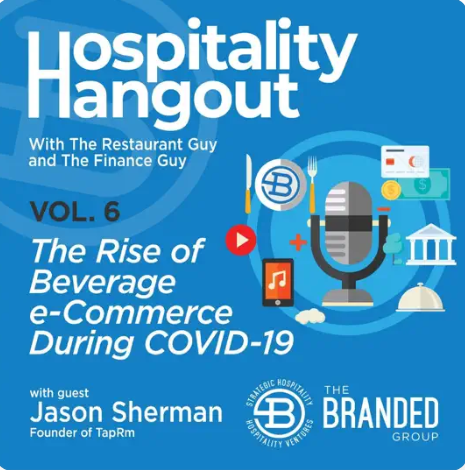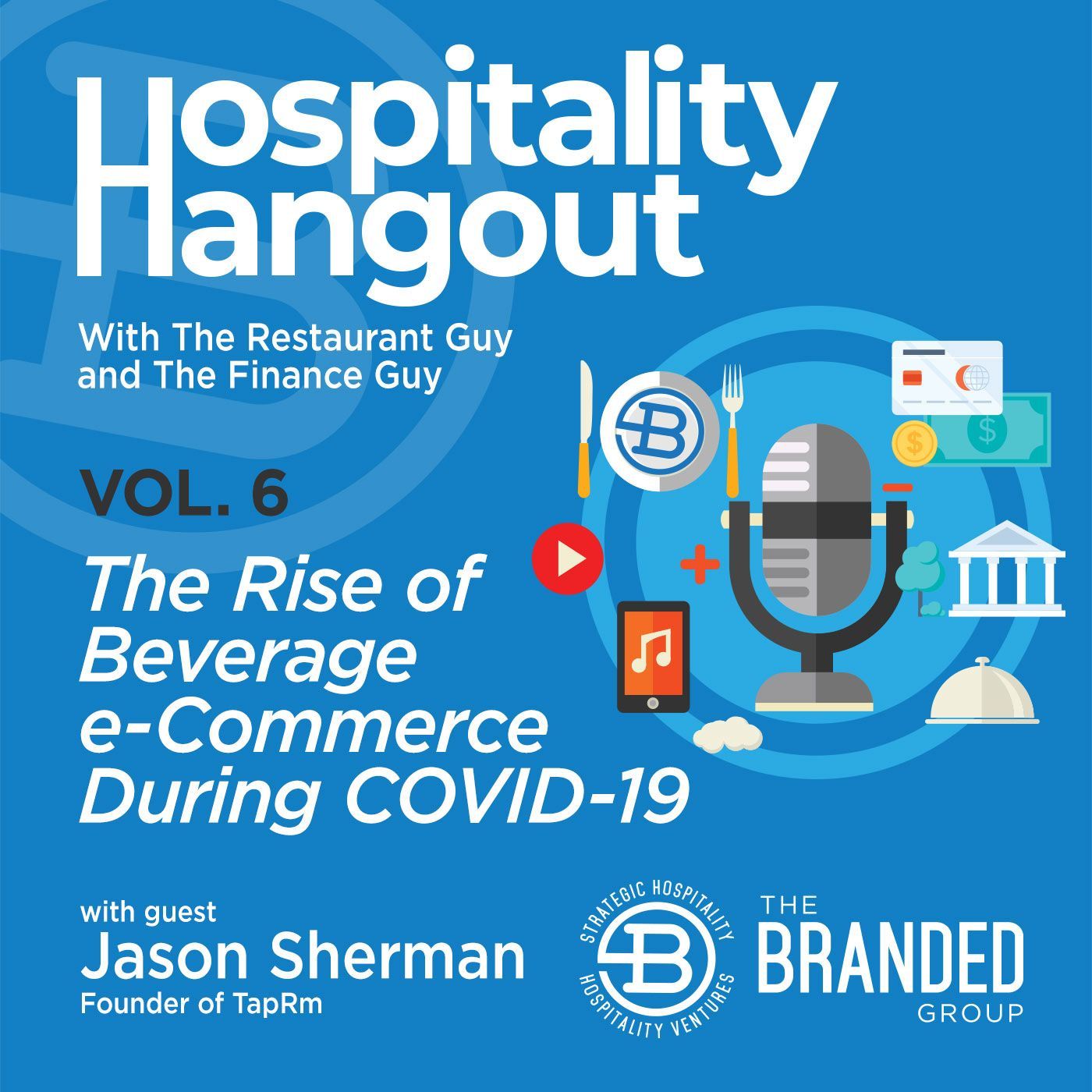The Future of Beverage E-Commerce After COVID-19

The COVID-19 pandemic dramatically altered consumer behavior across numerous industries, and the beverage sector was no exception. As lockdowns and social distancing measures became commonplace, online ordering and delivery services surged in popularity. This shift begs the question: will this trend continue? What does the future hold for beverage e-commerce? This blog post delves into the long-term trends accelerated by the pandemic, exploring the challenges and opportunities that lie ahead. We'll also be drawing upon insights from Jason Sherman, CEO of TapRm, a leading online beverage marketplace.
This topic was recently discussed on our podcast, The Hospitality Hangout, in an episode titled "The Rise of Beverage e-Commerce During COVID-19 Vol. 6: TapRm." In that episode, Michael Schatzberg "The Restaurant Guy" and Jimmy Frischling "The Finance Guy" spoke with Jason Sherman, CEO of TapRm to discuss the rapid growth and future of beverage e-commerce. You can listen to the full conversation here. Now, let's dive into the details!
The Pandemic's Impact on Beverage E-Commerce
The pandemic served as a catalyst for the rapid adoption of e-commerce across the board. Consumers, faced with restrictions on in-person shopping and dining, turned to online platforms for their needs, including beverages. Several factors contributed to this surge:
- Lockdowns and Restrictions: With bars, restaurants, and liquor stores facing closures or reduced capacity, online ordering became the only viable option for many consumers to purchase their favorite beverages.
- Convenience: E-commerce offers unparalleled convenience, allowing consumers to browse and purchase beverages from the comfort of their homes, eliminating the need to travel to a physical store.
- Safety Concerns: During the pandemic, many people were hesitant to venture out to public places due to concerns about contracting the virus. Online ordering and delivery provided a safer alternative.
- Expanded Selection: Online platforms often offer a wider selection of beverages than traditional retail stores, including craft beers, imported wines, and specialty spirits.
- New consumer behaviors: The younger generation and other tech-savvy populations have adopted app-based delivery services. During the pandemic these behaviors have spread across all populations.
These factors combined to create a perfect storm for the growth of beverage e-commerce. Existing online platforms experienced a surge in demand, and new players entered the market to capitalize on the growing opportunity.
Interview with Jason Sherman, CEO of TapRm
To gain deeper insights into the trends and challenges in the beverage e-commerce space, we spoke with Jason Sherman, CEO of TapRm, a leading online marketplace for craft beverages. TapRm partners with breweries, cideries, wineries, and distilleries to provide a platform for them to sell their products directly to consumers.
Jason shared valuable perspectives on the factors driving growth in the industry, the challenges of navigating regulatory hurdles, and the opportunities for innovation. He emphasized the importance of providing a seamless and convenient shopping experience for consumers, as well as building strong relationships with beverage producers. Some key takeaways from our conversation included:
- The "Try Before You Buy" Experience: The hospitality industry, beverage and food alike, traditionally had a strong advantage over e-commerce because it provided the ability for consumers to try new things before committing to a purchase. E-commerce can make up for this by providing better content, deals, and consumer reviews.
- Regulatory Hurdles: Navigating the complex web of state and local regulations surrounding alcohol sales and delivery remains a significant challenge for beverage e-commerce businesses.
- The Rise of Direct-to-Consumer (DTC) Sales: Beverage producers are increasingly looking to DTC channels to reach consumers directly, build brand loyalty, and control their own distribution.
- The Importance of Technology: Technology plays a crucial role in enabling beverage e-commerce, from online ordering and payment processing to inventory management and delivery logistics.
- The Power of Data: E-commerce platforms can collect valuable data on consumer preferences and purchasing behavior, which can be used to personalize the shopping experience and improve marketing efforts.
Jason's insights highlight the dynamic and evolving nature of the beverage e-commerce space, and the importance of adapting to changing consumer preferences and regulatory landscapes.
Key Trends in Beverage E-Commerce
Several key trends are shaping the future of beverage e-commerce. Understanding these trends is essential for businesses looking to succeed in this rapidly growing market:
- Personalization: Consumers are increasingly expecting personalized shopping experiences tailored to their individual preferences. Beverage e-commerce platforms are leveraging data and technology to provide personalized product recommendations, curated selections, and targeted promotions.
- Subscription Services: Beverage subscription services are gaining popularity, offering consumers a convenient way to discover new products and receive regular deliveries of their favorite beverages.
- Mobile Commerce: With the majority of consumers now using smartphones for online shopping, mobile commerce is becoming increasingly important. Beverage e-commerce platforms need to optimize their websites and apps for mobile devices to provide a seamless shopping experience.
- Social Commerce: Social media platforms are becoming increasingly integrated with e-commerce, allowing consumers to discover and purchase beverages directly from social media feeds.
- Sustainability: Consumers are increasingly concerned about the environmental impact of their purchases. Beverage e-commerce platforms are responding by offering sustainable packaging options, promoting eco-friendly brands, and reducing their carbon footprint.
- Convenience is king: The number one reason consumers shop online is for convenience. Beverage retailers who embrace this idea will see their businesses flourish, with some possibly evolving into businesses that sell nothing but beverages.
These trends reflect the evolving expectations of consumers and the increasing sophistication of e-commerce technology.
Challenges and Opportunities in the E-Commerce Beverage Space
While the beverage e-commerce space offers significant opportunities for growth, it also presents several challenges that businesses must overcome:
Challenges:
- Regulatory Compliance: Navigating the complex and often inconsistent regulations surrounding alcohol sales and delivery remains a major hurdle. Businesses must comply with state and local laws regarding licensing, taxes, and shipping restrictions.
- Shipping and Logistics: Shipping alcoholic beverages can be challenging due to regulations, temperature control requirements, and the risk of breakage. Businesses need to develop efficient and reliable logistics solutions to ensure timely and safe delivery.
- Competition: The beverage e-commerce space is becoming increasingly competitive, with established players and new entrants vying for market share. Businesses need to differentiate themselves through unique product offerings, superior customer service, and innovative marketing strategies.
- Age Verification: Preventing underage individuals from purchasing alcoholic beverages is a critical concern. Businesses must implement robust age verification systems to ensure compliance with regulations.
- Marketing Restrictions: Regulations on alcohol advertising can limit the marketing options available to beverage e-commerce businesses.
- Cost: E-commerce businesses need to keep cost at the top of their mind. The cost to acquire a customer, to fulfill the order, and to market their business should all be considered when determining if the business is working.
Opportunities:
- Expanded Market Reach: E-commerce allows beverage producers to reach consumers beyond their local market, expanding their potential customer base.
- Direct-to-Consumer (DTC) Sales: DTC channels provide beverage producers with greater control over their brand and distribution, allowing them to build direct relationships with consumers.
- Data-Driven Insights: E-commerce platforms can collect valuable data on consumer preferences and purchasing behavior, which can be used to personalize the shopping experience and improve marketing efforts.
- Innovation: The beverage e-commerce space is ripe for innovation, with opportunities to develop new products, services, and technologies that enhance the consumer experience.
- Partnerships: Beverage e-commerce businesses can partner with other companies, such as restaurants, bars, and event organizers, to expand their reach and offer unique experiences to consumers.
- Customer Education: E-commerce platforms offer great opportunities to educate customers on the nuances of their beverages. Brewers, winemakers, and spirit producers can use their platform to educate customers on production, aging, or what makes their beverages unique.
By addressing the challenges and capitalizing on the opportunities, beverage e-commerce businesses can position themselves for long-term success.
The Future of Online Beverage Ordering
Looking ahead, the future of online beverage ordering appears bright. Several factors suggest that the shift to online ordering will continue, even as the pandemic subsides:
- Changing Consumer Habits: The pandemic has accelerated the adoption of e-commerce among a wider range of consumers. Many people who previously preferred in-person shopping have now experienced the convenience and benefits of online ordering and are likely to continue using these services.
- Technological Advancements: Ongoing advancements in e-commerce technology, such as improved logistics, personalized recommendations, and seamless payment processing, will further enhance the consumer experience and drive adoption.
- Increased Investment: As the beverage e-commerce market continues to grow, more investment will flow into the sector, leading to further innovation and expansion.
- Regulatory Changes: Some states and local governments are easing regulations on alcohol sales and delivery, making it easier for businesses to operate in the e-commerce space.
- Demand for Convenience: Consumers increasingly value convenience and are willing to pay a premium for services that save them time and effort. Online beverage ordering offers unparalleled convenience, allowing consumers to purchase their favorite beverages from the comfort of their homes.
- The power of delivery apps: As delivery apps become more popular, and as they start to offer a wider selection of beverages and incentives for consumers, people will continue to shop online for beverages.
However, the future of beverage e-commerce will also depend on how businesses adapt to changing consumer preferences and regulatory landscapes. Those that can provide a seamless, personalized, and convenient shopping experience, while navigating the complexities of regulatory compliance, will be best positioned to succeed in the long term.
Conclusion: Will the Shift to Online Ordering Continue?
The COVID-19 pandemic undoubtedly accelerated the growth of beverage e-commerce, and while some shifts may normalize as the world returns to a new normal, the underlying trends point towards a continued increase in online beverage ordering. The convenience, expanded selection, and personalized experiences offered by e-commerce platforms are likely to continue to attract consumers, even as traditional retail channels reopen.
By understanding the key trends, addressing the challenges, and capitalizing on the opportunities in the beverage e-commerce space, businesses can position themselves for long-term success. The future of beverage retail is undoubtedly intertwined with e-commerce, and those who embrace this shift will be best positioned to thrive.
We explored these topics in detail on our latest episode of The Hospitality Hangout, titled "The Rise of Beverage e-Commerce During COVID-19 Vol. 6: TapRm." If you want to learn more about the future of beverage e-commerce and hear from Jason Sherman, CEO of TapRm, be sure to listen to the full episode here. Thanks for reading!






